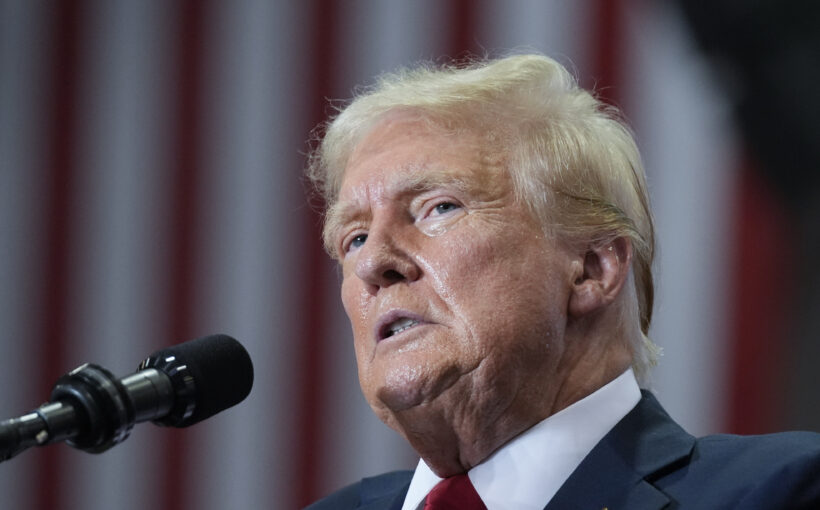U.S. District Judge Tanya Chutkan has signed off on a three-week delay in Donald Trump’s federal election case at the request of special counsel Jack Smith.
It’s the first time Smith has ever sought a slowdown in the case, in which the former president is charged with conspiring to steal the 2020 election and disenfranchise millions of voters. For more than a year, amid numerous efforts by Trump to delay, the special counsel argued that the gravity of the historic case required urgency and should be brought before a jury expeditiously. But Smith’s request to postpone a filing deadline this week is an acknowledgment that any chance of bringing the case to trial in the near future has all but disappeared.
The chief reason the case has been stalled is the Supreme Court’s handling of Trump’s bid for immunity. Last month, the high court ruled that Trump has “absolute immunity” from some of the special counsel’s allegations. But that decision also left many questions unresolved about how the rest of the case can proceed in Chutkan’s courtroom.
On Thursday evening, the special counsel asked for additional time to analyze the Supreme Court’s decision and propose next steps. Chutkan on Friday approved Smith’s request to postpone an Aug. 9 deadline until Aug. 30 for a filing that will help her set a schedule for the remainder of the case. Also at Smith’s request, the judge rescheduled the next hearing in the case from Aug. 16 to Sept. 5.
Chutkan, who herself has described the historic and grave weight of the case, had seemed poised to move more quickly until Smith asked her to slow down.
The moves of the last 48 hours, which came without much insight into Smith or Chutkan’s thinking, immediately set off a Washington parlor game about the secretive special counsel’s strategy now that a trial appears impossible before the November election. Should Trump prevail in that election, of course, he’s expected to quickly dissolve Smith’s office and end the case altogether.
Smith has never explicitly acknowledged the 2024 election as a factor in the urgency of his timeline. Instead, he has simply insisted that the public has an interest in seeing the case resolved as quickly as possible. Chutkan, similarly, has emphasized that the political calendar would have no bearing on her duty to ensure the fair administration of justice in Trump’s case. But it’s a factor that has lurked in the background, as Trump runs to assume control of the very department now prosecuting him.
Before this week, Smith had pressed Chutkan, an appeals court and the Supreme Court to make quick work of Trump’s effort to claim sweeping immunity from the charges so he could put Trump on trial quickly. But the Supreme Court allowed the immunity issue to be litigated much more slowly than Smith preferred, resulting in an eight-month delay in the trial court.
Since the Supreme Court’s July 1 ruling, Smith has appeared in no hurry to return the case to a fast track. Though his team requested in a portion of a legal brief it filed in April that the Supreme Court shorten its traditional month-long grace period before its rulings take effect, Smith did not renew that request once the ruling came out.
Without action on that request, the immunity ruling officially kicked in Aug. 2 and returned the case to Chutkan. The judge seemed ready for the moment: On the following day — a Saturday — she quickly dispatched with two of Trump’s long-pending motions to dismiss the case and scheduled the Aug. 16 hearing to determine other key deadlines.
Some observers have speculated that Smith’s sudden desire for more time — particularly to consider the impact of a ruling which has been public for more than a month — reflects internal tensions, either within his office or with the Justice Department officials who oversee him.
Neither has commented on the situation, but Smith’s Thursday evening filing hinted at potential dissension.
Describing “consultation with other Department of Justice components,” which Smith said was “well underway,” he nevertheless indicated that the government “has not finalized its position.”
“The Government therefore respectfully requests additional time to provide the Court with an informed proposal regarding the schedule for pretrial proceedings moving forward,” Smith wrote.
A sluggish pace has also characterized the other criminal case Smith brought against Trump, charging him with hoarding classified records at his Florida residence, refusing to return many of them on demand and obstructing the related federal investigation.
The judge overseeing that case, U.S. District Judge Aileen Cannon, has been largely responsible for the delays there. But in recent months, Smith has also seemed to back away from his previous emphasis on urgency.
When Smith sought a gag order against Trump over his false and inflammatory claims that the FBI tried to kill him in connection with an August 2022 raid of his Mar-a-Lago compound undertaken while he was not present, the prosecutor passed up chances to try to accelerate the issuance of such an order, despite claiming that Trump’s comments were putting FBI agents’ lives at risk.
And when the judge in the case dismissed the case altogether in June, Smith appealed that decision but has so far made no effort to accelerate the appeal. As a result, it seems unlikely to be heard before the election.


